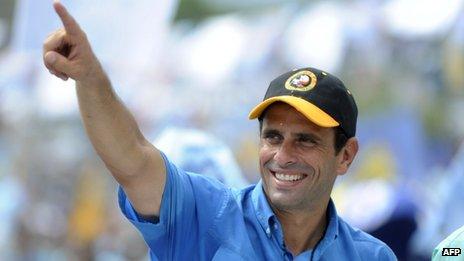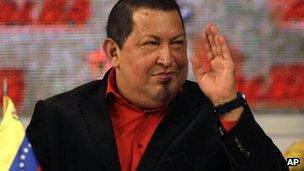Profile: Henrique Capriles
- Published

Henrique Capriles entered politics in his 20s and has held several posts
Henrique Capriles, a lawyer by training, has enjoyed a meteoric rise through the political ranks.
He has galvanised the Venezuelan opposition ever since the united opposition parties announced they would choose a single candidate to stand against President Hugo Chavez in October 2012's presidential poll.
After Mr Chavez's death, he accused the late leader's chosen successor, Nicolas Maduro, of abuse of power in taking on the post of acting president. "To become president, the people have to elect you," he said.
As the energetic governor of the state of Miranda, Mr Capriles likes to stay in touch with voters, visiting shantytowns, often on his motorbike, to supervise projects and play basketball with the locals.
He was photographed wading chest high in muddy flood waters when heavy rains brought landslides and chaos to Miranda in 2010.
This energetic style was carried over into his campaigning for the presidency in 2012.
Mr Capriles, 40, jogged to the electoral offices to register his candidacy and travelled across Venezuela to try to persuade voters to choose him.
However, Mr Chavez ultimately triumphed with 54% of the vote against Mr Capriles's 44%.
Mr Capriles says his political inspiration is former Brazilian President Luiz Inacio Lula da Silva who courted businesses and investors while also developing social programmes.
"Those who want progress, jobs, well-managed companies, somewhere we can develop small and medium businesses…everyone who wants that kind of country, come and join my bus for progress," Mr Capriles has said.
Arrested
Analysts say his youthful image is seen as one of his strengths.
He was involved with a group of other young politicians in setting up in 2000 a new opposition party Primero Justicia, or First Justice, which grew out of a civil association founded in 1992.
The new party set itself apart from Venezuela's established political parties that Mr Chavez likes to criticise so much.
Like many in Venezuela, Henrique Capriles is descended from immigrants - Dutch on his father's side, and Polish and Russian on his mother's.
His maternal grandparents were Jews who arrived in Caracas after fleeing the Holocaust in Europe during the World War II, a fact he likes to bring up when Chavez supporters accuse him of being a "fascist".
He had a privileged upbringing, studying law and going on to work in both the public and private sectors in Venezuela.
Mr Capriles describes his policies as "centrist" and "humanist" and has emphasised the need for better education to beat Venezuela's high levels of crime.

Mr Capriles has praised some of the policies of President Chavez
Entering politics at the age of 25, he became the country's youngest ever deputy in Congress, and was eventually chosen to be vice president of the house.
He then served as mayor of Baruta, a district within the capital Caracas, and was imprisoned in 2002 amid unrest during a short-lived coup attempt against President Chavez.
Anti-Chavez protesters had gathered at the Cuban embassy in Baruta where they suspected prominent Chavistas, among them the vice president, were hiding out.
They laid siege to the building but were eventually persuaded to disperse.
Afterwards, Chavez supporters alleged that Mr Capriles led the siege. He said he had helped to negotiate an end to the stand-off.
He was charged and brought to trial, but eventually acquitted.
The episode seemed to do nothing to dampen some voters' enthusiasm for the political wunderkind.
Mr Capriles stunned Chavez favourite Diosdado Cabello in 2008 when he beat him to the governorship of the state of Miranda, Venezuela's second most populous state.
Mr Capriles was chosen as the candidate of a coalition of opposition parties during a primary election in February 2012.
He praised some aspects of President Chavez's government, such as the push to build health clinics and schools in poor neighbourhoods.
Mr Capriles opposes nationalising more businesses, arguing that it discourages investment, but has said he would not automatically return expropriated assets to private owners.